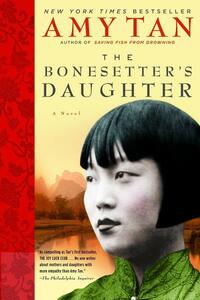Take a photo of a barcode or cover
dark
emotional
hopeful
inspiring
medium-paced
Beautifully written, and a compelling story. Somehow I just wasn't hooked, so I couldn't give it 4*. I would definitely read more of Amy Tan in the future though.
Goddamn can Tan write an ending. I'm not sure if this is my third or fourth go-round (Tan was one of my favourite authors in high school), but it's not as fresh to me as it once was. The first 40% is a bit of a slog, because Tan's "neurotic Asian-American daughter" characters are almost never as interesting as the stories told from the perspective of their mothers in the old country (the digression from this formula is what makes The Hundred Secret Senses Tan's strongest novel).
The book is divided into three sections: present day interspersed with the protagonist's childhood, followed by her mother's nightmarish life in China, and concluded with their amazing reconciliations.
The first section shows too many of Ruth's neuroses and makes her an unsympathetic character, with the situation skewed to suggest that everyone dislikes her and not without reason. The second section doesn't give great clues as to precisely how the woman described became the domineering woman of the first section. Then the third section somehow returns to Ruth while simultaneously softening both her and her mother, redeeming everything. So many loose ends are tied up in what could be seen as a cop-out expository dialogue, but expansion from a different character works very well.
It's amazing what Tan can achieve with a simple shift of a character's perspective. She turns the novel around and makes it worthwhile. I can imagine that a lot of people would be turned off by the opening (and I can't exactly remember what was so compelling about her work to my fifteen year old self), but it's definitely worth sticking with.
It's also worth noting that people accused Tan of writing the same book four times. When I get around to rereading Saving Fish From Drowning, I'll help you understand exactly how breaking free from family stories worked out for her (unmemorably and cynically attempting to grasp the zeitgeist).
The book is divided into three sections: present day interspersed with the protagonist's childhood, followed by her mother's nightmarish life in China, and concluded with their amazing reconciliations.
The first section shows too many of Ruth's neuroses and makes her an unsympathetic character, with the situation skewed to suggest that everyone dislikes her and not without reason. The second section doesn't give great clues as to precisely how the woman described became the domineering woman of the first section. Then the third section somehow returns to Ruth while simultaneously softening both her and her mother, redeeming everything. So many loose ends are tied up in what could be seen as a cop-out expository dialogue, but expansion from a different character works very well.
It's amazing what Tan can achieve with a simple shift of a character's perspective. She turns the novel around and makes it worthwhile. I can imagine that a lot of people would be turned off by the opening (and I can't exactly remember what was so compelling about her work to my fifteen year old self), but it's definitely worth sticking with.
It's also worth noting that people accused Tan of writing the same book four times. When I get around to rereading Saving Fish From Drowning, I'll help you understand exactly how breaking free from family stories worked out for her (unmemorably and cynically attempting to grasp the zeitgeist).
Very similar beats to all of Tan’s stuff but interesting pre-9/11 look at immigration stories and rural China of the 20s and 30s
emotional
reflective
slow-paced
Plot or Character Driven:
A mix
Strong character development:
Yes
Loveable characters:
No
Diverse cast of characters:
No
Flaws of characters a main focus:
Yes
I loved this book for its history and the appreciation shown between mother and daughter.
I really loved the section of LuiLing retelling her life. The rest was great, too, but that part I wished went on longer.
I thought I wouldn't enjoy this book but I was pleasantly surprised. It had an interesting plot that kept my attention throughout. A unique story of an Asian-American woman who unravels a mystery of who her mother and grandmother really are. An uplifting tale as well as an incredibly well written one.
I think that when Amy Tan is right on she is definitely right on. A few years ago I devoured every book she had written and still have all of her books on my bookshelf. I decided to re-read "The Bonesetter's Daughter" for my Booklikes-opoly square.
The "Bonesetter's Daughter"is told as a shifting narrative of a Chines American daughter (Ruth) trying to deal with her mother (LuLing) who is starting to lose her memory due to Alzheimer's. Ruth feels frustrated trying to deal with her mother and with her relationship with her lover Art. At times Ruth becomes mute and is unable to express herself. When she finds her mother's diary she decides to have it translated and the diary allows her to really see her mother for the first time.
Ruth was a trial for me at times. Seriously. I wanted her to take a stand against her boyfriend/lover and his terrible kids. They were exhausting to even read about. But I did feel smidgens of sympathy for her here and there. Her mother's obsession with ghosts, curses, and embarrassing her as a child are definitely things that would make it hard for you to sympathize initially with LuLing until we get to her story.
I will admit that at first I didn't like LuLing until we (readers) get to read the memoirs that Ruth is having translated from what her mother wrote. You get LuLing's earlier younger voice and your heart is definitely going to break when you read about what she dealt with while living in China. It also helps Ruth better understand her mother and realize why her mother acted the way she did while she was growing up. The two women get closer towards the end of the book which did make me happy.
I have always loved Amy Tan's writing. She manages to make every sentence count and just draw you in. I felt every second of LuLing's younger voice via her diary as she remembers what her life in China was like. And also her sadness when she realizes her daughter is pulling away from her. I will say though the reason why I only gave this four stars is that the first part of the book that primarily is told from Ruth's POV was hard to get through. That's why I didn't give it 5 stars.
The setting of the book goes back and forth from San Francisco to China. The China parts of the book felt the most alive to me. Reading about LuLing living at Immortal Heart made it seem like the a stark and desolate place.
The ending was poignant but also sad. I know that this book is quite realistic with showing how Alzheimer's affects people and families, but I still wished for a different ending.
The "Bonesetter's Daughter"is told as a shifting narrative of a Chines American daughter (Ruth) trying to deal with her mother (LuLing) who is starting to lose her memory due to Alzheimer's. Ruth feels frustrated trying to deal with her mother and with her relationship with her lover Art. At times Ruth becomes mute and is unable to express herself. When she finds her mother's diary she decides to have it translated and the diary allows her to really see her mother for the first time.
Ruth was a trial for me at times. Seriously. I wanted her to take a stand against her boyfriend/lover and his terrible kids. They were exhausting to even read about. But I did feel smidgens of sympathy for her here and there. Her mother's obsession with ghosts, curses, and embarrassing her as a child are definitely things that would make it hard for you to sympathize initially with LuLing until we get to her story.
I will admit that at first I didn't like LuLing until we (readers) get to read the memoirs that Ruth is having translated from what her mother wrote. You get LuLing's earlier younger voice and your heart is definitely going to break when you read about what she dealt with while living in China. It also helps Ruth better understand her mother and realize why her mother acted the way she did while she was growing up. The two women get closer towards the end of the book which did make me happy.
I have always loved Amy Tan's writing. She manages to make every sentence count and just draw you in. I felt every second of LuLing's younger voice via her diary as she remembers what her life in China was like. And also her sadness when she realizes her daughter is pulling away from her. I will say though the reason why I only gave this four stars is that the first part of the book that primarily is told from Ruth's POV was hard to get through. That's why I didn't give it 5 stars.
The setting of the book goes back and forth from San Francisco to China. The China parts of the book felt the most alive to me. Reading about LuLing living at Immortal Heart made it seem like the a stark and desolate place.
The ending was poignant but also sad. I know that this book is quite realistic with showing how Alzheimer's affects people and families, but I still wished for a different ending.






